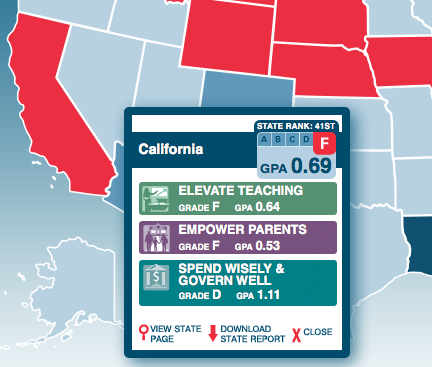Policymakers react to StudentsFirst’s ‘F’ for California

California's policy efforts to improve student achievement earned an F from StudentsFirst, the Sacramento-based advocacy grouping led by Michelle Rhee, the quondam Washington, D.C., schools chancellor. The state ranked 41st in the nation on education policies in 3 major areas involving teachers, parents and schoolhouse finance and governance. No land earned an A, and more than two-thirds of states received D's or F's on the group's Country Policy Written report Menu.
"While in that location is swell momentum for reform in a number of states, well-nigh every state has a long way to go in terms of reforming its policies," the report states. However, California is "stagnant," it said.
The ratings relied on a complex matrix that covered 3 major areas:
1) Drag teaching: States would earn good grades if they had comprehensive teacher and principal evaluations that were based on multiple measures, including 50 percent on student growth, classroom observations and pupil surveys. These evaluations would be used to decide whether to lay off or fire personnel or promote them and give them raises. States also won points if they had alternative certification paths for teachers.
two) Empower parents with data: States that gave letter of the alphabet grades to schools and notified parents if their children'south teachers were ineffective got loftier scores. Establishing a parent trigger that allows parents to demand a turnaround of a low-performing school as well every bit broader choices for depression-income students, such as Opportunity Scholarships, were rewarded with points. States could also earn good marks for establishing and supporting charter schools and belongings them answerable.
iii) Spend wisely and govern well: States that permit for mayoral and land control of low-performing schools would earn good grades. Fiscal transparency, the use of multiple direction strategies to realize efficiencies, and no class size restrictions for grades college than 3rd earned positive marks. This category also includes making teacher pensions portable and fair.
David Plank, executive director of Policy Assay for California Education (PACE), an education inquiry and policy group, questions the footing of Rhee's criteria.
"Some of the policies that she prefers might move state education in a positive direction," Plank said. "Some of them probably won't. Only in that location is no evidence nigh any of them. So there is no reason this particular set of policies should work. I don't think this report is very helpful or very interesting."
Reactions to the study card from legislators were mixed.
"In just a short period of time, StudentsFirst has proven itself to exist a leading voice for pedagogy reform and for our kids," said Kristin Olsen, vice chair of the Associates Committee on Education and a Republican from Modesto, in a press release that accompanied the written report. "They provide a necessary counterweight to influential unions and fight effectively for the kinds of pupil-focused policies that will improve public schools and increment achievement."
Only Joan Buchanan, chair of the state Assembly Committee on Education and a Democrat from Alamo, agreed with Plank. "Unfortunately the metrics used to develop the StudentsFirst report cards are based on the ideas of well-significant school reformers, not quality research," she said, adding that, for instance, no merit pay program has resulted in increased student accomplishment.
Poor grades on how the land evaluates teachers could exist expected from StudentsFirst, but California flunking empowering parents was surprising. In the report, the state is held upwards as an example considering of its parent trigger police. California also has a robust charter move and has been recognized as a national leader in how it funds charters.
The only category where California earned a "D" was on "spending wisely and governing well," perhaps considering of its recent conclusion to requite districts more flexibility in how they spend their dollars and the suspension of its requirement to reduce class sizes for boosted state funds.
Overall, said Sherry Griffith, legislative advocate for the Clan of California School Administrators (ACSA), the policy ideas in the report are "real sexy" but overlook the great strides the state has made in educatee achievement.
To become more reports like this one, click hither to sign up for EdSource's no-cost daily email on latest developments in teaching.
otwellgothered1950.blogspot.com
Source: https://edsource.org/2013/policymakers-react-to-studentsfirsts-f-for-california/25057
0 Response to "Policymakers react to StudentsFirst’s ‘F’ for California"
Post a Comment